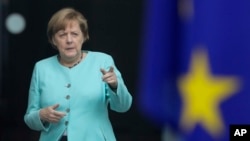German Chancellor Angela Merkel continues to maintain Europe cannot continue to entirely depend on the United States.
Merkel initially said Europe can no longer rely on the United States during a campaign event shortly after the Group of 7 summit in Italy in late May. She reiterated that position in an interview with the weekly Die Zeit that was published two days before she hosts U.S. President Donald Trump and other world leaders.
"It is, for example, open whether we can and should in the future rely on the U.S. investing so much as it has so far in the United Nation's work, in Middle East policy, in European security policy or in peace missions in Africa," Merkel said.
Divisive issues such as free trade, climate change and globalization are expected to be discussed at the G20 summit in Hamburg, which will also be attended by Russian President Vladimir Putin and Turkey's Tayyip Erdogan.
"While we are looking at the possibilities of cooperation to benefit everyone, globalization is seen by the American administration more as a process that is not about a win-win situation, but about winners and losers," Merkel added.
Merkel's remarks were made as Trump has become increasingly critical of trade agreements that he believes the United States should not continue to support, putting his "America First" approach at odds with the European Union and its advocacy of free trade.
Despite Trump's criticisms, the European Union and Japan are expected to announce Thursday the framework of a free trade agreement. The European Union recently finalized a trade deal with Canada, as Trump withdrew the United States from a proposed pact with Asia.
Merkel hosted a pre-summit meeting last week in Berlin with EU participants, who emphasized their support for the Paris agreement to fight climate change.
Merkel, among other European leaders, was sharply critical of Trump's decision at the G-7 meeting in Sicily not to reiterate support the 2015 climate change accord.
Merkel repeated the Trump administration's decision to withdraw from the Paris accord is "extraordinarily regrettable," although she noted that many U.S. states and cities want to continue supporting it.
The G20 summit comes at a time when the post Cold War world order shows signs of erosion as Russia and China increasingly assert themselves on the global stage.
German police say up to 100,000 protesters are expected to march in about 30 rallies, including radicals that may be prepared to use violence during the two day summit that begins Friday.
The protesters are a diverse group of people, including environmentalists and peace and anti-poverty activists, who believe the world's elite, protected by riot police, are not resolving urgent global problems.





